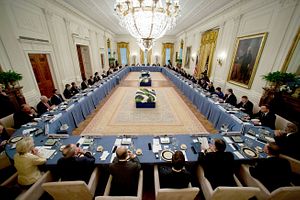For India, the fourth and final Nuclear Security Summit (NSS), which wrapped up in Washington, DC, last week, was meant to be an opportunity for it to demonstrate its bona fides as a responsible stakeholder to the global community. However, a seemingly off-the-cuff comment by U.S. President Barack Obama, the NSS host, has New Delhi upset. At a press conference following the conclusion of the NSS, Obama cited India alongside Pakistan as an “area where I think we’d need to see progress.” Specifically, he said the challenge was to ensure that “Pakistan and India, that subcontinent, … as they develop military doctrines, that they are not continually moving in the wrong direction.”
The Indian foreign ministry immediately protested. “Yes, we have seen those remarks. There seems to be a lack of understanding of India’s defense posture,” Vikas Swarup, the ministry’s spokesperson said. “Since the context was the Nuclear Security Summit, the President’s own remark that ‘expanding nuclear arsenals in some countries, with more small tactical nuclear weapons which could be at greater risk of theft’ sums up the focus of global concern,” Swarup said, referring obliquely to Pakistan, without mentioning names. Pakistan’s nuclear arsenal is currently the fastest growing in the world and the country is developing tactical nuclear weapons for battlefield use.
There are several reasons why Obama’s remarks would upset India. First, Obama commits the sin of lumping India and Pakistan together. The Indian government deeply resents any attempts to equate its nuclear security and nuclear doctrine with that of Pakistan’s. Additionally, some observers point to Obama’s statement as evidence of continued ‘hyphenation’ of India and Pakistan in U.S. strategic thinking. Until the second Bush administration, U.S. foreign policy and diplomacy generally saw India as inextricably linked to Pakistan. Following the Bush administration’s overtures to India in the 2000s, including a major civil nuclear cooperation deal, the United States ‘de-hyphenated’ India and Pakistan, but Indian observers remain sensitive to any hints of a return to that status quo ante.
Despite negative reactions in India, Obama’s remarks get an interesting view of strategic stability in South Asia. The reference to “military doctrines” suggests that Obama sees recent conventional and nuclear moves in the India-Pakistan relationship as detrimental. On the Indian side, Obama is ostensibly referring to India’s as-yet-unofficial ‘Cold Start’ doctrine, under which conventional forces would conduct coordinated offensive operations in Pakistani territory to stave off nuclear retaliation. On the Pakistani side, Obama is no doubt referring to Islamabad’s intent to deploy battlefield tactical nuclear weapons, which U.S. observers have long cited as a cause for concern. Last fall, for the first time, senior Pakistani officials clarified the conditions under which Pakistan would use low-yield nuclear weapons against India, citing India’s Cold Start as criteria.
Obama’s remarks correctly note that as matters stand, there are significant uncertainties about how conventional and nuclear developments Indian and Pakistani military planning affect the nuclear escalation ladder between the two neighbors and rivals. Worrying about wartime nuclear use in South Asia isn’t unreasonable. India and Pakistan have fought four wars since their independence, one of which was fought after both had come out as nuclear weapon states. While grounded analytical approaches to understanding the conflict escalation framework between India and Pakistan exist, the introduction of low-yield battlefield nuclear weapons and coordinated conventional offensive maneuvers introduces uncertainty.
Indian frustration over Obama’s remarks likely refers to what New Delhi sees as the U.S. president’s lack of understanding of the impetus for India developing Cold Start in the first place. Assessments of India’s conventional mobilization speed in the wake of major terrorist attacks–notably, the 2001 attack by Jaish-e-Mohammed militants on the Indian parliament–suggested a need for New Delhi to seriously pursue a proactive strategy, speeding up mobilization times to proffer conventional retaliation after provocative terrorist attacks. Though India ultimately reacted with restraint, the 2008 Mumbai attacks reinforced this idea. As I mentioned before, Cold Start remains unofficial and its existence has been denied by Indian officials repeatedly.
India is likely further frustrated by the public airing of differences by the U.S. president over its military choices. As a non-party to the Nuclear Nonproliferation Treaty (NPT) and a declared nuclear weapons state, India has faced special scrutiny from international observers on issues of nuclear security and continues to remain outside important organizations, including the Nuclear Suppliers Group (NSG). As the 2008 U.S.-India civil nuclear agreement and other similar agreements with other states since then have suggested, New Delhi has largely succeeded in carving out a unique position for itself as a “normal” nuclear country, despite being outside the rubric of the NPT. Though concerns persist about India’s progress on nuclear materials security, New Delhi is highly sensitive to insinuations that it is an irresponsible nuclear weapons state.
Pakistan, while no doubt unhappy, meanwhile, appears unsurprised by Obama’s remark that it is moving in the “wrong direction” with its decision to rapidly expand its nuclear stockpiles and adopt low-yield weapons. Islamabad and Washington have discussed their differences over this issue directly. For example, last November, when Pakistan’s Chief of Army Staff General Raheel Sharif visited Washington, DC, and met with senior State and Defense Department officials, the two sides addressed these questions. The idea of a “nuclear deal” for Pakistan–one that would place conditions on the scope of its nuclear program–surged in popularity in Washington last fall. (It has since lost steam.)
The uneasy rivalry between India and Pakistan has mostly simmered for the past 15 years, but the risk of it rising to a boil isn’t an unthinkable contingency. Obama is right that South Asia is a nuclear tinderbox, but his diagnosis of the problem identifies the symptoms instead of the disease. Ultimately, to walk back from the brink, the United States should be focusing on policies that can help reel in Pakistan’s use of subconventional warfare and cross-border terrorism. And that’s just for starters.

































